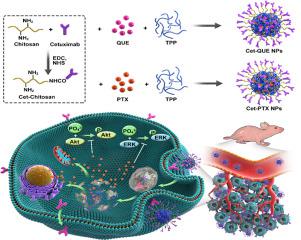Biomaterials Advances ( IF 5.5 ) Pub Date : 2020-08-25 , DOI: 10.1016/j.msec.2020.111442 Yonghong Wang , Hongli Yu , Saisai Wang , Chengcheng Gai , Xiaoming Cui , Zhilu Xu , Wentong Li , Weifen Zhang

|
Chemotherapy plays crucial roles in the clinical treatment of non-small cell lung cancer (NSCLC). Nevertheless, acquired chemoresistance is a common and critical problem that limits the clinical application of chemotherapy. Quercetin (QUE), a natural bioflavonoid, has significant antitumor potential, which has been verified in many drug-resistant cancer cell lines and animal models. Here, we explored whether QUE could reverse the resistance of NSCLC to paclitaxel (PTX)-based therapy. The results of cell viability revealed that QUE could synergistically enhance the cytotoxicity of PTX in A549 and A549/Taxol cells. Furthermore, Akt and ERK phosphorylation had no significant changes in A549/Taxol cells treated with PTX. However, it was significantly inhibited by the combination treatment of QUE and PTX. To improve the antitumor activity of PTX due to its hydrophobicity and eliminate its toxicity, we prepared targeted biodegradable cetuximab chitosan nanoparticles (Cet-CTS NPs) to deliver PTX and QUE using ionic cross-linking technique. The targeted NPs displayed a particle size of 290 nm and sustained release of PTX and QUE. In addition, the targeted Cet-CTS NPs loaded with PTX and QUE inhibited tumor growth in PTX-resistant A549/Taxol cells. Cet-QUE NPs decreased tumor growth in PTX-resistant xenografts. In conclusion, the administration of QUE by using Cet-CTS NPs could provide a prospective strategy for the treatment of PTX-resistant lung cancer.
中文翻译:

基于壳聚糖的纳米粒子靶向槲皮素的靶向递送,其使耐紫杉醇的肺癌细胞对紫杉醇敏感
化学疗法在非小细胞肺癌(NSCLC)的临床治疗中起着至关重要的作用。然而,获得性化学抗药性是一个普遍且关键的问题,限制了化学疗法的临床应用。槲皮素(QUE)是一种天然的生物类黄酮,具有显着的抗肿瘤潜力,已在许多耐药性癌细胞系和动物模型中得到证实。在这里,我们探讨了QUE是否可以逆转NSCLC对基于紫杉醇(PTX)的治疗的耐药性。细胞活力的结果表明,QUE可以协同增强PTX在A549和A549 / Taxol细胞中的细胞毒性。此外,在用PTX处理的A549 / Taxol细胞中,Akt和ERK磷酸化没有明显变化。但是,QUE和PTX的联合治疗显着抑制了它。为了提高PTX的疏水性并消除其毒性,我们制备了靶向可生物降解的西妥昔单抗壳聚糖纳米粒子(Cet-CTS NPs),以使用离子交联技术递送PTX和QUE。靶向的NP显示出290nm的粒径并持续释放PTX和QUE。此外,载有PTX和QUE的靶向Cet-CTS NP抑制了PTX抗性A549 / Taxol细胞中的肿瘤生长。Cet-QUE NPs降低了耐PTX异种移植物中的肿瘤生长。总之,通过使用Cet-CTS NP进行QUE的给药可以为治疗PTX耐药的肺癌提供前瞻性策略。靶向的NP显示出290nm的粒径并持续释放PTX和QUE。此外,载有PTX和QUE的靶向Cet-CTS NP抑制了PTX抗性A549 / Taxol细胞中的肿瘤生长。Cet-QUE NPs降低了耐PTX异种移植物中的肿瘤生长。总之,通过使用Cet-CTS NP进行QUE的给药可以为治疗PTX耐药的肺癌提供前瞻性策略。靶向的NP显示出290nm的粒径并持续释放PTX和QUE。此外,载有PTX和QUE的靶向Cet-CTS NP抑制了PTX抗性A549 / Taxol细胞中的肿瘤生长。Cet-QUE NPs降低了PTX耐药异种移植物中的肿瘤生长。总之,通过使用Cet-CTS NP进行QUE的给药可以为治疗PTX耐药的肺癌提供前瞻性策略。











































 京公网安备 11010802027423号
京公网安备 11010802027423号